What Happens Immediately After You Declare Bankruptcy?
Posted on Saturday, March 2nd, 2024 at 5:04 pm
 Many people who run businesses with overwhelming debt will eventually consider the pros and cons of filing for bankruptcy. Whether you file for Chapter 7, Chapter 11, or Chapter 12 bankruptcy, filing can provide significant financial relief. This allows business owners to improve their financial health by filing for different types of bankruptcies. Understanding what happens in the days and weeks after declaring bankruptcy can help you make an informed decision about whether to file. As such, the experienced and knowledgeable team at Bradford Law Offices has compiled this helpful overview of what happens when you declare bankruptcy.
Many people who run businesses with overwhelming debt will eventually consider the pros and cons of filing for bankruptcy. Whether you file for Chapter 7, Chapter 11, or Chapter 12 bankruptcy, filing can provide significant financial relief. This allows business owners to improve their financial health by filing for different types of bankruptcies. Understanding what happens in the days and weeks after declaring bankruptcy can help you make an informed decision about whether to file. As such, the experienced and knowledgeable team at Bradford Law Offices has compiled this helpful overview of what happens when you declare bankruptcy.
Steps for Filing Bankruptcy
Before declaring bankruptcy, you must complete credit counseling with an approved provider. Then, you’ll need to file a petition for bankruptcy with the appropriate court, along with schedules detailing your assets, liabilities, income, and expenses. You’ll also need to pay the required filing fees. Speak to an experienced North Carolina business bankruptcy attorney for more information on declaring bankruptcy.
The Assignment of a Bankruptcy Trustee
Once you file for bankruptcy, the court will assign a trustee to oversee your case. The trustee’s primary responsibility is to ensure that your creditors are treated fairly and that you comply with all bankruptcy rules and regulations. They will review your financial documents, liquidate non-exempt assets (if applicable), and distribute funds to your creditors.
Meeting of Creditors
Within a few weeks of filing, you must attend a meeting of creditors, also known as a 341 meeting. Creditors are invited to these meetings, but they generally do not attend.
Before the meeting occurs, you will need to provide paperwork such as bank statements, tax returns, and documents confirming your identity. During the meeting, the trustee will ask you questions about your financial situation and the information you provided in your bankruptcy petition. You must answer these questions truthfully under oath.
The Implementation of an Automatic Stay
One of the most significant benefits of filing for bankruptcy is the automatic stay. When you file your bankruptcy petition, an automatic stay goes into effect, providing immediate protection from your creditors.
The automatic stay is a legal injunction prohibiting creditors from continuing to collect debts against you or your business. This means that creditors must stop calling you, sending collection letters, garnishing your wages, repossessing your property, or pursuing lawsuits against you. The automatic stay applies to most types of debts, including credit card debts, medical bills, and business loans.
There are some exceptions to the automatic stay, however. For example, it does not stop criminal proceedings, certain tax proceedings, or the collection of child support or alimony payments. Additionally, if you have filed for bankruptcy multiple times within recent years, the automatic stay may be limited or may not apply at all.
The automatic stay provides much-needed breathing room for business owners struggling with overwhelming debt. It allows you to focus on the bankruptcy process and develop a plan for restructuring your debts or liquidating your assets without the constant pressure and harassment from creditors.
Effects on Your Business Credit Score
If you are considering declaring bankruptcy, your commercial credit score (also known as a business credit score) is likely already low. However, you should keep in mind that filing for bankruptcy will have a further negative impact on your business credit score.
A Chapter 7 bankruptcy declaration will stay on your credit report for up to 10 years, and a Chapter 11 or Chapter 12 bankruptcy will remain on your report for up to 7 years. This can make it difficult to obtain new credit or loans in the future. However, with time, effort, and the support and advice of a skilled bankruptcy attorney, you can rebuild your credit score after bankruptcy.
Considering Declaring Bankruptcy? Contact Bradford Law Offices Today
Deciding to declare bankruptcy is one of the most consequential decisions you will ever make for your business. Executed properly, filing for bankruptcy might mean the difference between keeping your business afloat and closing it down permanently. With so much at stake, it is essential to work with a legal professional with a thorough understanding of business bankruptcy law.
The experienced Raleigh business bankruptcy attorneys at Bradford Law Offices have dedicated nearly 30 years to guiding businesses through the bankruptcy process, and our track record demonstrates our commitment to success. We will advise you on your options, file the necessary paperwork, and represent you at hearings. Call our law firm today at (919) 758-8879 or contact us online for a confidential consultation to learn more about how we can help you.